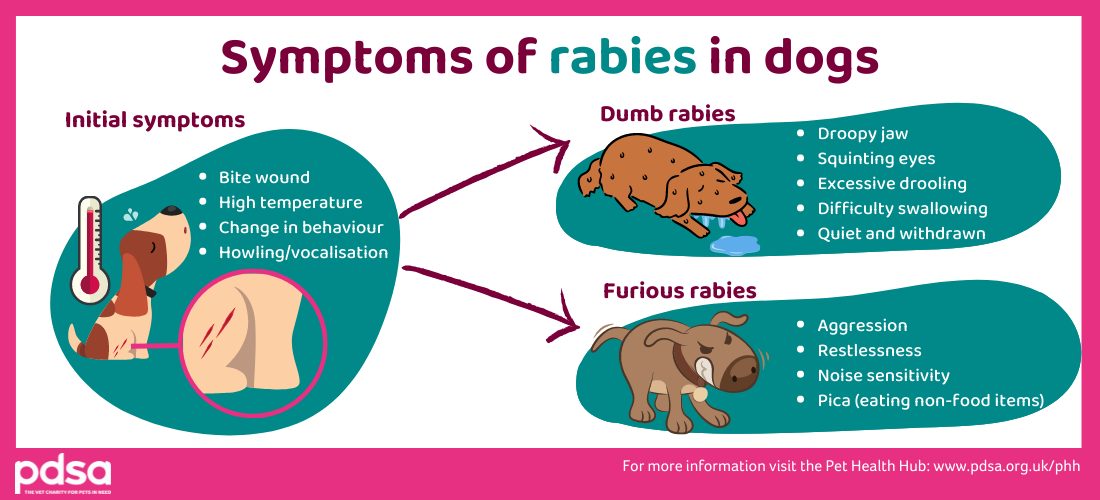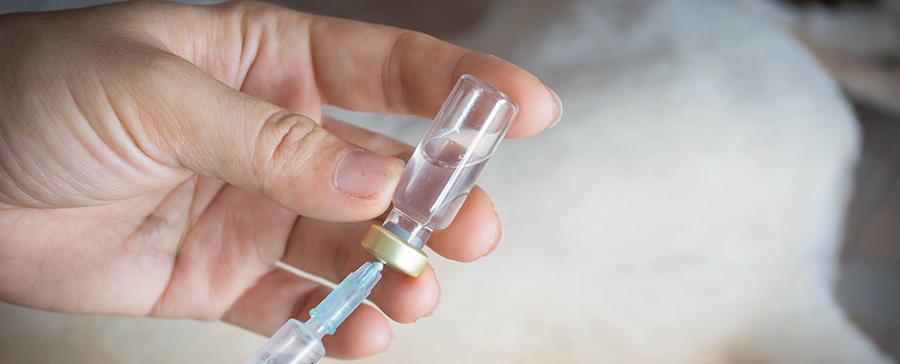Rabies in dogs
Overview
- Rabies is a deadly virus that can spread between animals and people.
- It travels through saliva, so dogs tend to catch it if another infected animal bites them.
- Rabies attacks the brain and nerves, causing symptoms such as drooling, fever, aggression and weakness.
- The UK is currently free of rabies, but many other countries aren’t, so it‘s a legal requirement to vaccinate any dogs that travel outside the UK.
- Unfortunately, there is no treatment for rabies in dogs.
- You can find information on rabies in cats here.
How does rabies affect dogs?
Rabies is a deadly virus that attacks the central nervous system (brain and nerves), causing severe symptoms and eventually death. It travels in saliva, so dogs tend to catch it if an infected animal bites them, or if they have an open wound that’s licked by an infected animal, but this is much rarer.
Rabies is a zoonotic disease, which means it can spread between animals and humans. The UK is currently rabies-free, so it’s essential that we take precautions to ensure it doesn’t get reintroduced, for example, by vaccinating any dogs that come from or travel abroad.

Symptoms of rabies usually take 2-8 weeks to develop after the bite, but in some rare circumstances, it can take up to a year.
Early symptoms include:
- Fever (high temperature)
- Changes in behaviour
- Howling or yelping
- Licking or chewing the bite wound
Rabies can then develop in one of two ways, ‘dumb rabies’ (most common) or ‘furious rabies’.
Dumb rabies symptoms include:
- Droopy jaw
- Squinting eyes
- Excessive drooling
- Difficulty swallowing
- Becoming very quiet and withdrawn
Furious rabies symptoms include:
- Aggression
- Restlessness
- Noise sensitivity
- Pica (eating things that aren’t food)
Hydrophobia (fear of water) is only seen in humans and is not a symptom of rabies in dogs.

The best, and the only way to prevent rabies in dogs is to vaccinate against it. However, this is only necessary for dogs that travel abroad because the UK is currently rabies-free.
Rabies vaccination is essential for any dog, cat, or ferret travelling outside of the UK, and is part of the PETS travel scheme. Read more about travelling with your pet on the government website.
- Dogs must be at least 12 weeks old and microchipped before they have the rabies vaccine.
- Proof of vaccination must be noted on their travel documents.
- Boosters must be kept up to date for as long as you want to keep travelling with your pet.
- Some countries may require a blood test to check the vaccine has been successful.
You should plan well in advance with your vet.
Side effects of rabies vaccines
Fortunately, most dogs don’t experience any side effects at all after the rabies vaccine, and if they do, they are usually mild (high temperature, low energy, and a reduced appetite), and pass within 24-48 hours. Serious side effects, such as anaphylaxis (severe allergic reaction), are extremely rare (less than 1 in 10,000), but if your dog does experience any side effects, speak to your vet straight away.
Rabies in bats
Although the UK is currently free from rabies there is a similar ‘rabies-like’ virus called ‘Lyssavirus’ which infects some species of bats. It’s spread in the same way as rabies, through a bite or scratch from an infected animal, so the risk to humans is incredibly low unless they handle bats regularly.
Avoid handling a bat unless absolutely necessary. If your dog catches a bat or if you need to handle a bat (i.e. if it is grounded/injured) wear bite-proof gloves to protect from any potential risk and contact the Bat Conservation Trust for specialised advice on how to help a sick or injured bat.
When to contact your vet
Contact your vet if your dog has been bitten by an animal abroad, or if you are concerned they have signs of rabies. You should also contact your vet if your dog has a reaction to their rabies vaccination.
If you are planning to travel abroad, you must contact your vet well in advance to prepare documents, give any vaccinations and administer blood tests or other necessary treatments.
- How often do I need to vaccinate my dog for rabies?
- Can my dog be vaccinated if they are poorly?
- Are vaccinations dangerous?
- Can I catch rabies from my dog?
How often do I need to vaccinate my dog for rabies?
Most rabies vaccinations last three years, although some dogs need a booster one year after their first injection. Some countries may require annual vaccinations, so check the requirement in advance. Your dog’s rabies vaccinations need to be up-to-date if you want to take them abroad.
Can my dog be vaccinated if they are poorly?
It’s always safest to give a vaccination when your dog is fit and healthy, so you may need to delay their vaccination if this isn’t the case. Contact your vet for advice if your dog is showing any signs of illness before their vaccination appointment.
Are vaccinations dangerous?
All vaccines used by vets in the UK are licensed, meaning they have to go through rigorous safety checks before they are approved for use. These licenses are also under constant review by the Veterinary Medicines Directorate to make sure they stay safe. As with any medication, there’s always the possibility of side effects, but they are rare, and the benefits of vaccination far outweigh the risks.
Can I catch rabies from my dog?
Yes, if your dog has rabies and you are bitten by them, it’s possible that you could catch the disease. However, the UK is currently rabies-free so this would only be possible if your dog has travelled abroad and caught rabies from another animal, in which case your dog would probably be showing symptoms.
If you are bitten by an animal while you are abroad then you should see a doctor as soon as possible and don’t wait until you get back to the UK. Early treatment is very effective in humans, so seeing a doctor quickly means the disease will be highly unlikely to develop.
Published: January 2024
Did you find this page useful?
Tell us more
Please note, our vets and nurses are unable to respond to questions via this form. If you are concerned about your pet’s health, please contact your vet directly.
Thank you for your feedback
Want to hear more about PDSA and get pet care tips from our vet experts?
Sign up to our e-newsletter
Written by vets and vet nurses. This advice is for UK pets only. Illustrations by Samantha Elmhurst.
